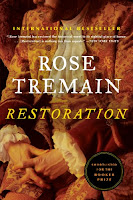In A Room Made of Leaves, the splendid Kate Grenville takes the scanty historical materials covering the settlement of Sydney to build a narrative of Elizabeth Macarthur, settler and early wool entrepreneur in New South Wales. In 1790, Mrs. Macarthur, wife of Captain John Macarthur of the New South Wales Corps, was the first wife of a British soldier to arrive in Sydney. It’s well-established that her husband was at the least a prideful and disputatious man, and made things difficult for himself and all around him, including, of course, his wife.
Every marriage has its own emotional tenor and nuances, and Grenville supplies these for the Macarthurs brilliantly. Balancing what we know of the captain’s character against the undeniable achievements of his wife, this author-supplied shading feels inevitable, spot-on. Other unknowable particulars, such as Elizabeth’s marriage prospects or the couple’s courtship, we gladly leave to Grenville’s highly capable imagination. Suffice it to say these treatments are every bit up to Grenville’s mastery, proving once again why she is among the first rank of novelists today.
These particulars are a matter of public record, but as is so often the case, the public record leaves a great deal to be desired—and corrected. I’ll start by citing some of the bare background. Elizabeth Macarthur managed the first and most exemplar wool station in Australia. Her husband made two journeys to England, each of these under either arrest or a cloud of suspicion, and his absences totaled 13 years between 1801 and 1817. During that time, Elizabeth bred and developed the fine wool-producing sheep that eventually led to Australia’s first-in-the-world wool industry that thrives to this day.
A Room Made of Leaves has its flights of poetry, however; this is no dry tome. The established fact of Elizabeth’s ability as an amateur astronomer and botanist was celebrated in 1920s newspaper accounts. Grenville reaches a level of poetry in treating her ongoing studies with Lt. Dawes, the first Royal Astronomer of Australia. The author bestows her soaring language on Elizabeth’s quest for knowledge as she braves the novelty of the observatory’s remote location and the difficulties of reaching it (pp. 195-196):
Each step revealed a new marvel: a view through the bushes of a slice of harbour rough and blue like lapis, a tree with bark of such a smooth pink fleshiness that you could expect it to be warm, an overhang of rock with a fraying underside, soft as cake, that glowed yellow. The wind brought with it the salt of the ocean and the strange spicy astrigency given off by the shrubs and flowers. There was an almost frightening breadth and depth and height to the place, alive with openness and the wild energy of breeze and trees and the crying gulls and the brilliant water. Alone, a speck of human in a place big enough to swallow me, I looked about with eyes that seemed open for the first time. … It was not a long track, but it was a journey into another landscape, another climate, another country.”
Such are the treats we expect and welcome from Kate Grenville. She has produced a fine, nuanced, and fully fictionalized version (which from me is the highest praise possible) of a historical person. In the process she honors one of Australia’s most important and influential pioneers, one who feels the guilt at the treatment of the Aboriginals—and who admits her own complicity in it—but one who bravely raised her children and her ran agricultural holdings in the face of steep odds. With this memorable book, Grenville does her bit to redress the prejudice against women’s accomplishments and gives us a vivid personal retelling of a unique moment in history.


















